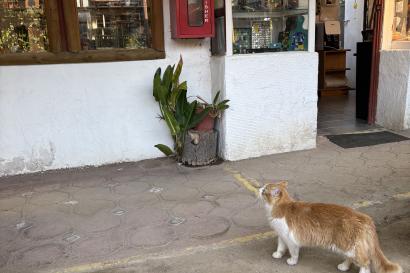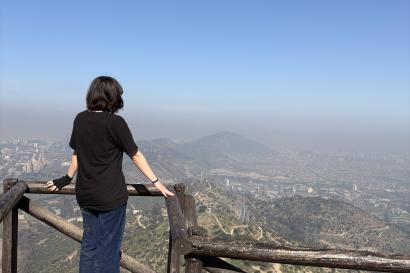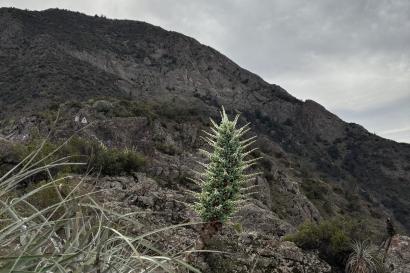Billy Pilgrim became unstuck in time several times.
My experience of October 20th-24th was limited to two rectangles: the T.V. and the window to the right of my bed.
I’ve been meaning to talk about this window for a while because it is one of my favorite parts of Santiago. The light feels clean and soft sifted through the sheer curtains. In the morning I open the blinder gradually, by inches, to give myself a gentle return to the sensory world. The blinders are a heavy wooden rattling thing. When I worked for conference services at Oxy I had a diagram of the archaic Erdman windows - the pulley, sash, and weight mechanism that always seemed to be broken. I’ve made a lazy assumption that my blinders work the same way with a weight hidden inside the jam of the window. All of this serves to emphasize that I have thought a lot about my window, certainly enough to sketch it.
The sketch I made is a bit sad - I need to buy new pencils. The painting, if there ever was one, would be titled “expat’s view of the revolution”. A lot of my sketches have veered from reality and back to my normal exploratory modes. Casual lines that I try to elaborate, human faces contorted into different shapes, odd textures. Incidental, indifferent.
I was eating cheese empanadas with my host mom in front of the T.V. and she gasped. There were military tanks in the street, something she hadn’t seen since the dictatorship. She told me about how she had been tear-gassed once at work, so they ate lemons to soothe the burning. It feels like Piñera was banking on this revitalized fear of military occupation to drown out the protests. Or maybe not. But seriously, what was he expecting with militia marching through the streets?
In an early draft for my first blog post here (remember the airport and hand-quaking anxiety?) I had described a feeling of placing my face too close to a T.V. - the colors flash and overwhelm your vision, the static of electricity pricks your skin sweetly, distant experiences captured in a glass. I had originally meant it to describe when you are in a new place and a new moment, most probably with intense anxiety. Everything feels so close to your face that you can’t see it and don’t understand what is happening. My experience is the opposite now. The visceral and immediate experience of other people is mediated through a neon luminescent rectangle. I’m given time to think and digest.
Part two: I’m in a mood.
This past Thursday we had a farewell dinner at the top of San Cristobal - fancy Champagne and such. We made thank you cards for the staff and professed our gratitude. The city below us had an aesthetic glittering hum and someone commented that we would have a perfect view of the next burning building - a type of morbid hopefulness.
I don’t mean that simply as a joke, although it is easy to use the humor shield when we start talking about hope. During dinner, it felt like our professors were bursting with a direct and affirming hopefulness about the last few weeks. I hear the same hopefulness on every cement surface of Santiago - the buildings and brick walls have come alive with the collective voices. Some are positive, most press into you with their urgent declarations. Privatized water, TPP-11, Piñera, dictatorship, Capitalism, the police and militia, evade. An occasional “go vegan!”.
Everyone at the dinner table sang "El derecho para vivir en paz” while I frowned at the small pin IES Abroad had gifted us: a Chilean and U.S. flag, crossed. I’m usually more animated when it comes to social unrest but I was admittedly in a bad mood. I couldn’t tell if it was because I was still hungry, my friends were leaving, hormone shifts, or the fact that dinner parties always feel like prolonged agony. I’m going home in a few weeks, returning to the country where my privilege runneth over. In this moment I feel like an intruder.
At Oxy, words, like revolution, are thrown around lightly in our strange social performance of wokeness. We write a lot of papers about decolonization and I’m potentially the most guilty of this. Just like the T.V. screen metaphor, I use academia to interpret from a distance lived experiences and fit them into aesthetically pleasing rectangles. Partly it is my ingrained art student instinct because there is a good chance I was finger painting with amniotic fluid in the womb. Art is everything to me, but I’m usually questioning its relevance. In Temuco last week, people beheaded a Pedro de Valdivia statue. What a powerful art piece! I think to myself. But does art have that license to scoop up and commodify the reality of oppression, so casually?
Revolutions are violent and people are being hurt. There will continue to be pain. I’m going home in a few weeks and could easily let Chile fall to the back of my memory (trust me I’m good at repressing complicated experiences). I have the option to remove myself from these situations because my privilege as a U.S. college kid gives me a lot of mobility. I’m probably always going to have options. Maybe that’s what I’m mad about. This small sliver of the Andes is turning malleable in the hands of the people, and the U.S. in contrast feels rigid and cold.
Maybe I’m in a mood because I’m sad about leaving. Maybe the hopefulness could be packaged like a righteous healing balm, and I could bring some home. That sounds too aesthetically pleasing.
The statue decapitation: https://www.theguardian.com/world/2019/nov/05/chile-statues-indigenous-mapuche-conquistadors
Here are some links in English if you want to see a bit more of what’s happening. (Sorry if you don’t have NYtimes access, I recently got it for free and it’s been great (Thanks Oxy!!))
https://www.nytimes.com/video/world/americas/100000006795557/chile-protesters-shot-eye.html?fbclid=IwAR2LHfqLnEeWx61vlOlW3r9in7EAfy9UABLAFn0J5xGqEYBdUs9mOWSU-oI
https://www.nytimes.com/2019/10/22/opinion/chile-protests.html?searchResultPosition=7
https://www.npr.org/2019/10/19/771545299/chiles-capital-engulfed-in-chaos-as-metro-protests-intensify

Danika Odell
<p>Aside from art, I'm long-distance running fanatic. I live a short drive from Eugene, a name that has become synonymous with Tracktown USA. My family doesn't understand why I feel a deep emotional attachment to the old Hayward field stands currently under reconstruction. I don't either, really.</p>








